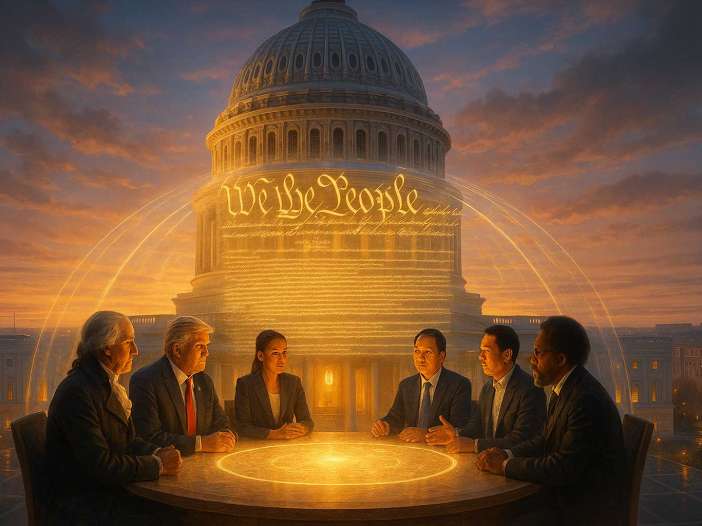
|
Getting your Trinity Audio player ready...
|
Introduction by George Washington
“When we first conceived this Union, I believed the Senate would serve as the nation’s steady heart — a place where reason might temper passion, and where conscience might restrain ambition. Yet I observe now that what was meant as a shield for liberty has too often become a weapon against it.”
The filibuster, designed to preserve minority rights, has grown into a tool of paralysis. Senators who once rose to deliberate now rise to delay; debate, once noble, is now theater. The chamber that should be the conscience of the Republic has become its choke point.
I do not speak in condemnation, but in remembrance — for democracy cannot endure when its guardians confuse obstruction with principle. The measure of freedom is not how loudly we speak, but how earnestly we listen. If the Senate cannot act for the common good, then the people themselves must reclaim the purpose of representation.
Reforming the Senate is not an act of rebellion against tradition; it is fidelity to it. For no institution was ever sacred except the one built upon the people’s trust. To reform the filibuster is not to weaken the Republic, but to restore its breath — to let deliberation serve the nation once again.
Let us therefore examine this debate not as partisans, but as heirs — charged with guarding the flame of liberty, not smothering it beneath the ashes of procedure.
(Note: This is an imaginary conversation, a creative exploration of an idea, and not a real speech or event.)
Topic 1 — The Spirit of the Senate: Has the Filibuster Become a Weapon Against Democracy?
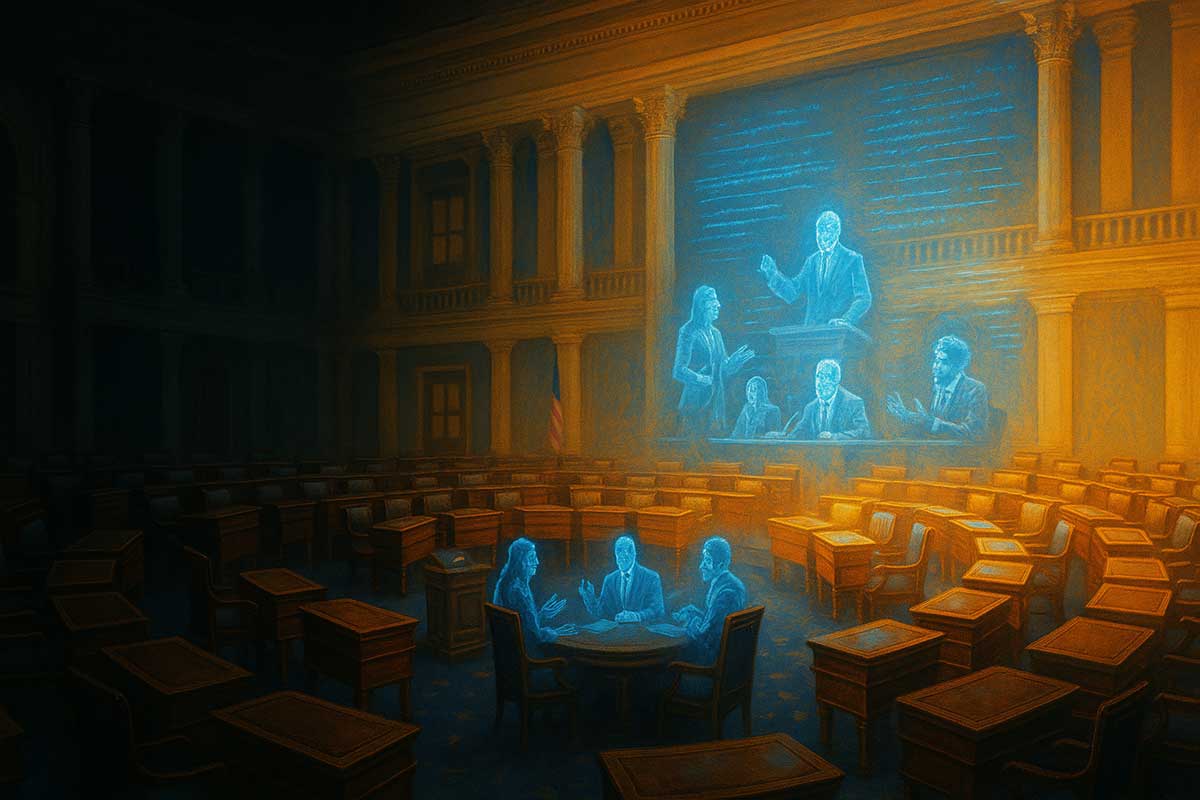
Setting:
The restored Old Senate Chamber, lit by candlelight and holograms of the Founding Fathers. The marble gleams like frozen history. A hush settles as George Washington rises from the mist, his calm presence bridging centuries.
George Washington:
“When we conceived this Senate, it was meant to cool the hot passions of democracy—yet today the chamber feels frozen in place. I ask you: has the filibuster protected the Republic, or imprisoned it?”
Donald Trump:
“It’s simple, George. The people elected a majority to act, not to wait. When sixty votes are needed just to start governing, that’s not tradition—it’s tyranny by procedure. I say end it. Let’s make the Senate move again.”
John Thune:
“I respect your sense of urgency, Mr. President, but the Senate’s slowness is its strength. It forces conversation across divides. Take that away, and every swing of power becomes a wrecking ball.”
Alexandria Ocasio-Cortez:
“Senator Thune, slowing down isn’t the same as shutting out. The filibuster was never designed to let forty-one senators block help for millions. It’s become a loophole for lobbyists, not a shield for democracy.”
Andrew Yang:
“Maybe the real problem isn’t the filibuster itself, but how outdated it is. Imagine if procedural tools rewarded compromise—say, an algorithmic vote-weighting system that amplifies bipartisan bills. Technology could preserve deliberation while ending abuse.”
Cornel West:
“My dear brothers and sisters, the filibuster has become the spiritual symbol of paralysis. It was meant to ensure conscience, but it now serves convenience. Democracy is not safeguarded by silence; it is sanctified by struggle.”
George Washington:
“Then tell me—if we abolished it tomorrow, would America truly be freer, or would we awaken a new chaos where each majority rules without restraint?”
Thune:
“I fear that chaos more than gridlock. Without the filibuster, each election could undo everything that came before. Businesses couldn’t plan, states couldn’t trust, and citizens would live under laws as fleeting as political winds.”
AOC:
“But Senator, stability without justice is just comfort for the comfortable. The same argument was used to stall civil-rights laws. Sometimes progress requires disruption.”
Trump:
“Exactly. You don’t fix a system by keeping the brakes on forever. When I build something, I clear the obstacles. Government should work the same way—efficient, decisive, delivering results.”
Yang:
“What if we could model both stability and agility? Think of the Senate as an operating system. You need checks for bugs, yes, but too many checks crash the system. Balance can be coded.”
West:
“Beware, my brother. No algorithm can encode the cry of the poor. The danger of unfettered majority rule is arrogance; the danger of endless minority rule is apathy. Both starve the soul of the Republic.”
George Washington:
“Perhaps the true question is not which rule stands, but what virtue guides those who wield it. Tell me—how do we restore the moral spirit of deliberation that once animated this chamber?”
West:
“By remembering that deliberation is not delay but devotion—the willingness to listen deeply before deciding swiftly. The Senate must recover reverence for the least among us.”
AOC:
“I agree, but reverence needs reform. Open the process. Stream it live. Let citizens witness every hold, every delay. When people can see obstruction, shame can work faster than any rule change.”
Yang:
“Transparency is step one. Step two is participation. Use civic-tech platforms to let voters weigh in directly on key bills. When citizens feel involved, senators feel accountable.”
Thune:
“I admire the idealism, but virtue can’t be outsourced to apps. It’s built through trust—and trust comes from patience. If we automate too much, we lose the human element of persuasion.”
Trump:
“I say persuasion’s fine, but results matter more. The moral spirit of governance is performance—delivering prosperity, safety, and pride. We can’t moralize our way out of stagnation.”
George Washington (rising):
“I have heard in your words both the hunger for action and the plea for restraint. Perhaps the wisdom lies not in abolishing or defending the filibuster, but in ensuring that every rule serves the people, not the politicians.”
He looks upward, where ghostly words shimmer above the chamber—E Pluribus Unum.
Cornel West:
“The republic’s test, my friends, is not whether we move fast or slow, but whether we move justly. A Senate without compassion is a body without breath.”
AOC:
“And justice begins when the people’s voice weighs more than a senator’s ego.”
Trump:
“Then let’s prove it—end the excuses, pass real laws, and make America win again.”
Thune:
“Let’s not win by losing our soul.”
Yang:
“Maybe the 21st-century Senate must be both code and conscience—iterative, transparent, human.”
Washington (final reflection):
“In my time, we built the Senate to restrain passion. In yours, it must revive purpose. If rules divide, rewrite them. If power corrupts, share it. But never let the flame of reason die within this hall.”
The holograms fade. The senators remain—staring at one another in uneasy silence, aware that history is watching.
Topic 2 — Power and Paralysis: When Majority Rule Isn’t Control
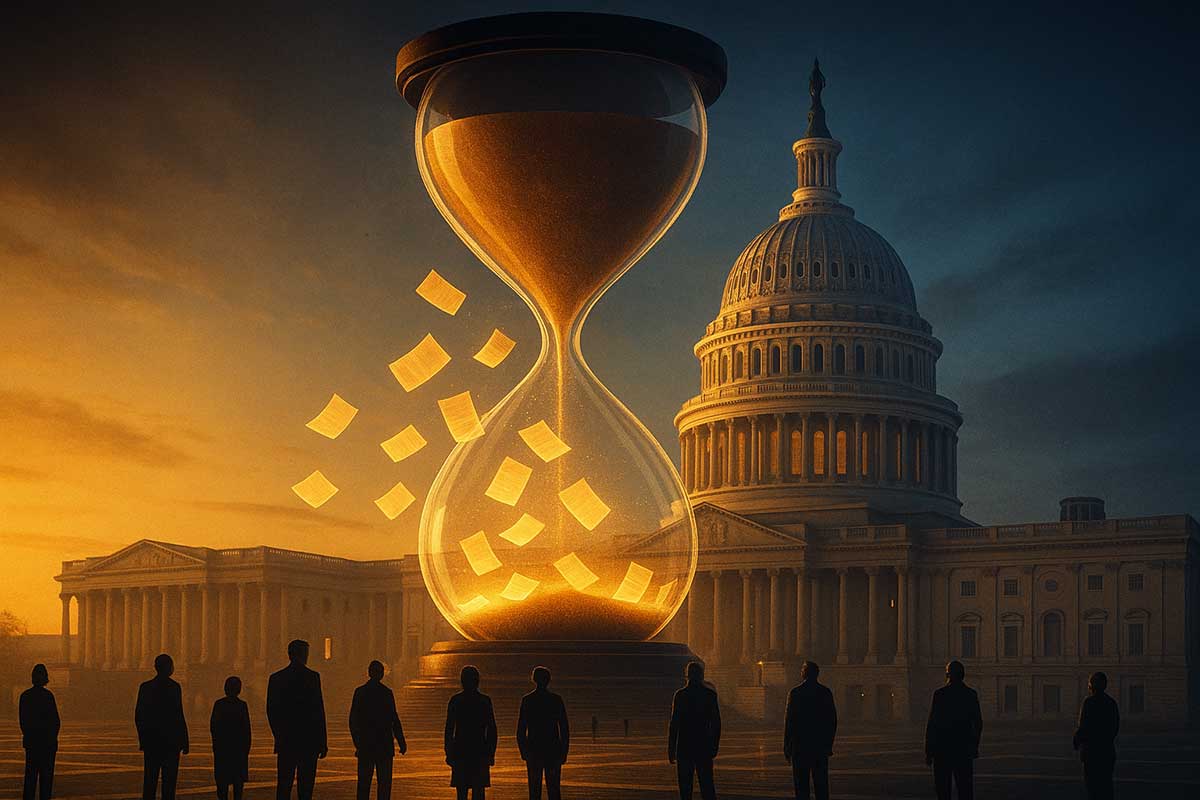
Setting:
The Old Senate Chamber glows in twilight. The portraits of Lincoln, Webster, and Clay shimmer faintly, as if leaning in to listen. The great clock ticks—each second like the heartbeat of a divided nation.
George Washington:
“You have spoken of rules and restraint, yet the Republic stands at an impasse. The people elect a majority, but that majority cannot govern. Tell me—how has power come to mean paralysis?”
John Thune:
“Because we’ve turned procedure into warfare. Every vote now carries the weight of a campaign ad. Senators no longer seek consensus; they seek survival. The majority is trapped by optics, not opposition.”
Alexandria Ocasio-Cortez:
“True, but that’s not paralysis—it’s design. Our system was built to protect privilege, not progress. The filibuster and other procedural tools serve those who already have power. What looks like ‘gridlock’ is really control disguised as tradition.”
Donald Trump:
“Washington, I’ll tell you what happened. The swamp learned how to weaponize delay. They hide behind process so they don’t have to deliver. If business ran like Congress, every company in America would be bankrupt.”
Andrew Yang:
“Procedural stagnation is the natural outcome of analog systems in a digital world. The Senate’s operating code was written for horse-and-quill communication. We’re still using parchment rules in a quantum era.”
Cornel West:
“My dear brothers and sisters, paralysis is spiritual before it is political. When truth becomes partisan, motion becomes impossible. The Senate no longer debates ideas—it debates identities.”
George Washington:
“You remind me of the Constitutional Convention. We too fought over power and principle. Yet we found union in necessity. What necessity could unite your age?”
Yang:
“Data. Shared truth. Imagine a national civic platform where every American sees the same verified facts about a bill’s cost, impact, and progress. If we’re divided by illusion, transparency could be the new unity.”
AOC:
“Transparency is power. But it must include participation. Let citizens vote on major spending priorities in real time—public input dashboards tied to appropriations. Make Congress feel the nation’s pulse.”
Thune:
“I caution against mistaking noise for participation. Instant feedback can amplify outrage, not understanding. We must not govern by trending hashtags.”
Trump:
“I’m fine with direct participation—as long as it’s fast and decisive. But let’s be honest, half the gridlock comes from weak leadership. When I say we’ll build, we build. When others say it, they form a committee.”
West:
“Yet even your decisiveness, my brother, must bend to justice. Efficiency without empathy becomes tyranny in a tailored suit. We need neither chaos nor command, but compassion married to courage.”
George Washington:
“Then let me ask plainly—can a republic survive if every law must be negotiated through fear of losing the next election?”
Trump:
“It can’t. That’s why we must restore strength. Senators should serve term limits. You stay too long, you become the problem. Fresh energy brings clarity.”
Thune:
“Term limits may refresh faces, but not ethics. The problem isn’t time; it’s trust. Once trust breaks, no rule can mend it.”
AOC:
“Trust is broken because people feel invisible. The Senate governs 330 million people as if it were still 1790. Representation must evolve—expand the chamber, or redesign it to reflect population. Power concentrated in tradition is power denied.”
Yang:
“I’d go further. Redefine representation entirely. Use digital citizen proxies—verified individuals who vote on behalf of constituents’ live preferences. You’d have a Senate that literally updates with public sentiment.”
West:
“But even if we wired the chamber with the latest code, we’d still need moral courage to act. The machine cannot substitute for mercy. A living democracy requires living souls, not programmable ones.”
George Washington (thoughtful):
“In my time, we feared monarchy. In yours, you fear one another. The chains that once bound kings now bind Congress. How shall this generation reclaim movement without madness?”
AOC:
“By remembering that action without inclusion is violence. We move together, or we move backward. Every reform must start with those least served by the system.”
Thune:
“By restoring deliberation as a virtue, not a vice. Listening is not weakness—it’s leadership. But it must lead somewhere; endless debate becomes moral exhaustion.”
Trump:
“By cutting the red tape. You want government that works? Fire half the bureaucrats, streamline the votes, and build results that people can see and touch.”
Yang:
“By prototyping governance. Pilot reforms in smaller states first, collect data, then scale nationwide. We’d treat policy like software—always improving, never stuck.”
West:
“By loving the people more than loving power. Until the Senate remembers its citizens as sacred, not statistical, paralysis will be its punishment.”
George Washington (rising slowly):
“Each of you speaks a fragment of truth. Yet a nation cannot be governed by fragments. The question is not whether power rests with the majority or minority, but whether either remembers their duty to the whole.”
The candles flicker as his voice echoes through marble:
“When principle becomes party and courage becomes career, liberty dissolves quietly, not with rebellion but with apathy.”
Trump:
“Then maybe it’s time for a new rebellion—against the bureaucracy itself.”
AOC: “Or a new beginning—built on people, not procedure.”
Thune: “Or a restoration—of humility before haste.”
Yang: “Or a redesign—of democracy itself.”
West: “Or a rebirth—of conscience over convenience.”
Washington (final words):
“Perhaps the republic’s salvation lies in all of these. Power must move again—but not away from the people, rather toward them.”
The chamber lights dim. The portraits fade, leaving the living senators illuminated by a faint, golden dawn—the promise of movement without destruction.
Topic 3 — Governance in the Age of Algorithms: Can Technology Save Democracy?

Setting:
The Old Senate Chamber now flickers with holographic light. The desks glow faintly, displaying lines of code that dance like fireflies. The marble ceiling projects fragments of the U.S. Constitution, rewritten in living digital text.
George Washington:
“When we forged this Republic, parchment carried our words, and quills our hopes. Yet you stand in an age where the quill has become code. Tell me—can technology rescue democracy from decay, or will it hasten its demise?”
Andrew Yang:
“Technology is neutral, George—it magnifies intent. If used wisely, it can rebuild trust. Imagine a national civic platform where every citizen tracks bills, sees spending in real time, and verifies promises with data. Sunlight, finally made digital.”
Donald Trump:
“I like transparency, but tech also brings chaos. You give everyone a megaphone, and nobody listens. What we need is digital authority—clean data, quick decisions, no bureaucratic layers. That’s how you make government work like business.”
Alexandria Ocasio-Cortez:
“Except democracy isn’t a business, Mr. President—it’s a relationship. Technology can empower people, but only if it’s equitable. Otherwise, it becomes just another tool for the powerful to manage the powerless.”
John Thune:
“Technology cannot replace deliberation. The Senate is not a server farm. Governance requires judgment, and judgment grows through discourse, not downloads.”
Cornel West:
“My dear brothers and sisters, the question is not whether the algorithm can govern, but whether the human heart can still feel. Democracy dies when convenience becomes the new constitution.”
George Washington:
“Yet your people demand speed. They trust their phones more than their leaders. Should government mirror this hunger for immediacy—or resist it?”
Trump:
“Mirror it! Speed is strength. We can’t let outdated systems choke progress. If a senator can’t keep up, maybe he shouldn’t be in office. Real-time decision-making, real-time accountability—that’s the future.”
Yang:
“Speed can serve deliberation if designed correctly. We could use participatory AI systems to simulate the outcomes of legislation before voting—economic models, environmental impact, social equity scores. It’s like seeing the future before you legislate it.”
AOC:
“That’s powerful—but also dangerous. Who writes those algorithms? Who decides what counts as ‘impact’? Bias isn’t just in people—it’s in code. If we automate decision-making without democratizing code, we’ve replaced one form of oligarchy with another.”
Thune:
“I agree with the congresswoman. Algorithms should advise, not decide. We must not outsource moral weight to machines. Once senators defer to data, conscience becomes obsolete.”
West:
“Indeed, data without compassion is information without wisdom. Technology must kneel before ethics, not the other way around.”
George Washington:
“You speak of conscience and code as if they are enemies. But could they not be allies? Could the tools of your time strengthen the virtues of ours?”
Yang:
“Yes. Imagine civic AI as a partner—a transparent adviser trained not on profits, but on public good. It could summarize debates, highlight compromise points, even warn when rhetoric outweighs reason. A moral mirror for Congress.”
Thune:
“That’s worth exploring, but only if we maintain human oversight. Perhaps committees could include digital ethics auditors, ensuring no algorithmic manipulation of legislation.”
AOC:
“Agreed. But let’s go further—open-source everything. Let citizens see the code behind policy modeling. Democracy’s software should belong to the people, not the contractors.”
Trump:
“I like that—open it up. But also make it efficient. No more ten-thousand-page bills nobody reads. Every law should fit on one screen: clear, fast, accountable.”
West:
“Ah, but brevity without beauty is still barren. The law must not only be legible—it must be lovable. Let your code sing the song of justice, not the hum of profit.”
George Washington (smiling faintly):
“Justice written in code—what a curious dream. Yet tell me this: if we automate fairness, do we also automate freedom?”
AOC:
“No. Fairness without choice is just programming. Freedom means the power to change the code—to rewrite the system when it fails the people. That’s what makes democracy alive.”
Trump:
“But people already had that power and didn’t use it. Maybe automation forces discipline—keeps leaders from wasting time.”
Yang:
“Automation should amplify agency, not replace it. Imagine citizens training their own local civic AIs to reflect community priorities—education in one district, health in another. Governance becomes personalized but connected.”
Thune:
“That could decentralize government too far. We might lose national unity if each region runs on its own algorithm. Some inefficiency preserves coherence.”
West:
“The tension between unity and diversity is the eternal American symphony. Let each voice sing its truth, but tune the harmony to compassion. Even algorithms must learn to love.”
George Washington (rising):
“Then perhaps your future rests not on machines, but on the hands that guide them. When our ink dried upon the Constitution, we knew that perfection was impossible—but responsibility was eternal.”
He gestures toward the glowing text above. The Constitution’s words fade into binary code, then into a heartbeat waveform pulsing across the ceiling.
Trump:
“The system’s broken. We need speed.”
AOC: “We need justice.”
Thune: “We need balance.”
Yang: “We need redesign.”
West: “We need redemption.”
Washington (final reflection):
“When power becomes programmable, remember this: the machine may process truth, but only the human soul can practice it. Let technology serve liberty—not master it.”
The chamber dims as the holographic code dissolves into stars. For a moment, it feels as though democracy itself is rewriting—alive, self-aware, still possible.
Topic 4 — Moral Economics: Who Suffers When Government Stops Working?

Setting:
The Old Senate Chamber glows dimly, its grandeur shadowed by the flicker of candlelight. Outside, faint thunder rumbles — a storm over Washington. Projected images hover in the air: food lines, closed federal offices, empty grocery shelves. The senators feel the chill of their decisions.
George Washington:
“When government halts, it is not marble that grows cold — it is the hearts and tables of the people. Tell me, my friends, who suffers when the machinery of the Republic stops turning?”
Alexandria Ocasio-Cortez:
“It’s the families who depend on SNAP, the children who skip breakfast, the federal workers who still show up but aren’t paid. Gridlock isn’t abstract — it’s hunger with a ZIP code.”
Donald Trump:
“I agree the people suffer, but not because of action — because of inaction. When Congress plays politics with funding, everyone loses. That’s why I want fast budgets, strong deals, no endless negotiations. America needs builders, not bureaucrats.”
John Thune:
“Yet haste can wound just as surely as delay. Fiscal responsibility is not cruelty; it’s stewardship. Every dollar spent unwisely is a promise stolen from the next generation.”
Andrew Yang:
“The truth is, both compassion and competence are failing. Our economic system is reactive — it responds to crisis, not prevention. If we had real-time budgeting powered by data, essential services like SNAP could never be held hostage to politics.”
Cornel West:
“My brothers and sisters, the greatest poverty is not material but moral. When leaders treat the poor as pawns, the republic itself becomes impoverished. A government shutdown is not just a policy failure — it is a spiritual one.”
George Washington:
“In my day, we taxed tea and sparked a revolution. Today, you withhold wages and spark despair. How can a nation founded on liberty justify the bondage of hunger?”
Trump:
“By ending the shutdowns once and for all. Get rid of the filibuster, pass clean budgets, and hold people accountable. The private sector feeds America when government fails — maybe that’s the model we need.”
AOC:
“Except the private sector doesn’t feed everyone. Corporations aren’t meant to solve inequality — government is. If we surrender that duty, we’re abandoning the very idea of a nation that protects its people.”
Thune:
“We must protect the people, yes — but also protect their future. Printing money to fund endless programs is not compassion; it’s inflation. We can’t buy morality with deficits.”
Yang:
“Senator, we can modernize morality. Automate relief systems that respond instantly when the economy stalls — universal basic income triggered by data. You can stop suffering before it starts.”
West:
“Automation without empathy is arithmetic without mercy. We must ensure that efficiency does not erase humanity. A mother’s dignity cannot be coded into a spreadsheet.”
George Washington:
“You speak of hunger and systems, of hearts and codes. But I ask you — what is the true measure of a nation’s strength: its wealth, or the welfare of its weakest?”
AOC:
“The welfare of its weakest, always. America’s greatness isn’t measured by stock tickers; it’s measured by school lunches. Until every child eats, no senator should sleep.”
Thune:
“But compassion without structure collapses. A strong economy funds justice — it doesn’t follow it. We must encourage self-reliance as we extend safety nets.”
Trump:
“I built empires by focusing on results. The government should do the same: clear goals, measurable success, no excuses. We can help the poor and win economically.”
Yang:
“Results are crucial, but metrics must reflect meaning. What if we measured national success by well-being instead of GDP — mental health, access to food, educational growth? The numbers would finally tell the truth.”
West:
“My dear friends, prosperity without love is poverty of the soul. When the powerful legislate without tears for the powerless, democracy decays. Let the Senate weep again — then perhaps it will act.”
George Washington (solemnly):
“Your words weigh heavy as thunder outside these walls. We built this nation to ensure posterity’s blessings — yet the poor inherit our indifference. Tell me, then — what would a moral economy truly look like?”
Yang:
“A moral economy is preventive, not punitive. It invests early — education, mental health, automation preparedness. Every dollar spent wisely saves ten later.”
AOC:
“It’s participatory. People should have a voice in how budgets are spent. Open-source the process, let citizens decide what ‘moral spending’ means. Democracy shouldn’t end at the ballot box.”
Thune:
“It’s balanced. Protecting the needy doesn’t mean punishing the productive. Incentivize charity, reward responsibility. The moral economy must also be sustainable.”
Trump:
“It’s strong. Prosperity creates freedom. The best welfare system is a booming economy — jobs, investment, pride. That’s what keeps America great.”
West:
“And yet, my brothers, no economy can be moral unless it measures mercy. Justice must not depend on the Dow Jones. Until the least of these can live with dignity, no growth graph can sanctify the nation.”
George Washington (rising):
“When we wrote the Constitution, we prayed that freedom would feed all. Yet I see that in your century, freedom starves some while feeding others. You may have conquered the earth — but have you mastered your conscience?”
He looks toward the holographic images of empty plates and closed stores, which now flicker into scenes of hope — people sharing food, neighbors helping neighbors, a light glowing in every window.
Trump:
“Let’s end government failure once and for all.”
AOC: “Let’s end moral failure, too.”
Thune: “Let’s remember responsibility is part of compassion.”
Yang: “Let’s build systems that prevent pain, not just respond to it.”
West: “And let us remember: love is the only currency that never devalues.”
Washington (final reflection):
“When the government stops, the people must not. Yet a wise republic ensures they never have to. The Senate must learn this truth again: justice delayed is hunger delivered.”
The thunder fades. Outside, dawn breaks through the storm clouds — fragile, golden, and full of possibility.
Topic 5 — The New American Blueprint: Beyond Filibusters and Factions
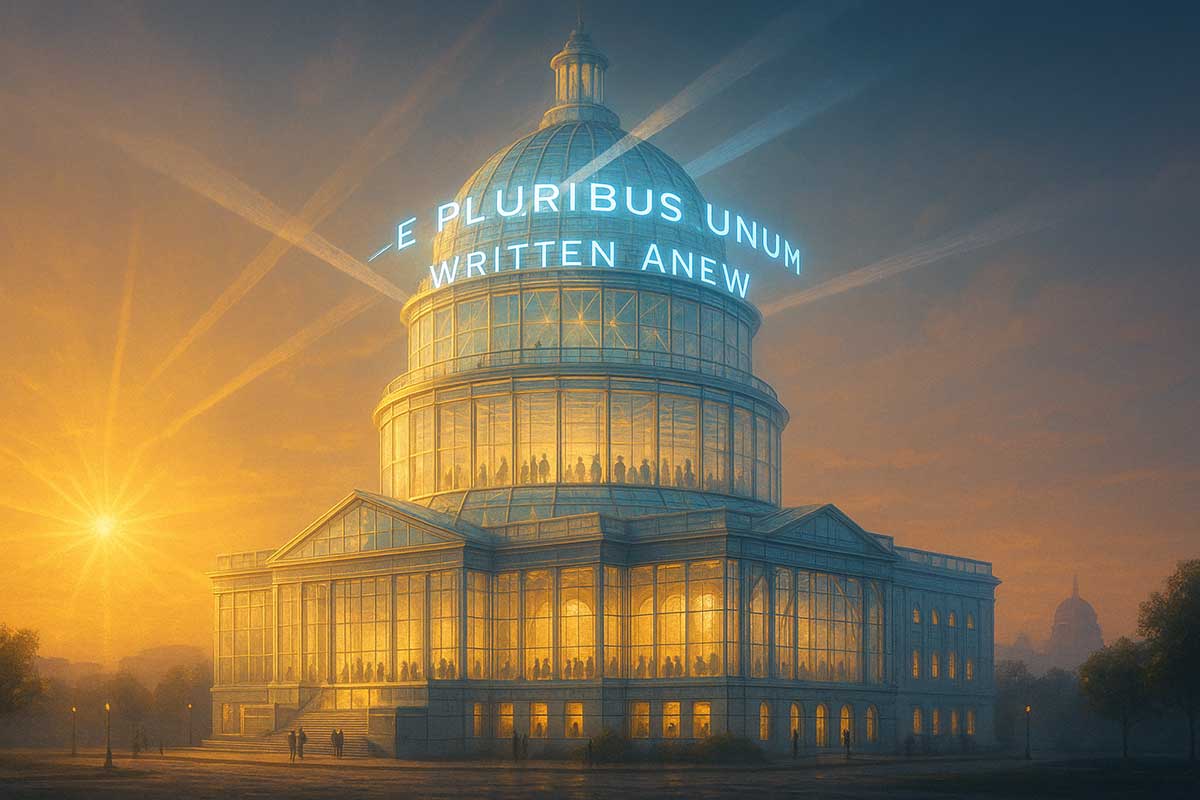
Setting:
The Old Senate Chamber glows with a soft golden dawn. The storm has passed. The holograms of past senators fade into the marble, replaced by a living projection of the future Capitol — transparent walls, open floors, citizens visible in the gallery below. A digital Constitution pulses on the walls, alive, breathing.
George Washington:
“For four nights we have debated the chains that bind this Senate — filibusters, fears, and factions. But tonight, I ask not what is broken, but what might be born. Tell me — what should a new American blueprint look like?”
Donald Trump:
“It starts with action, not talk. The blueprint must be bold — fewer rules, faster results, direct accountability. Every citizen should see what government’s doing, when, and how much it costs. Make leadership measurable. That’s how you rebuild trust.”
Alexandria Ocasio-Cortez:
“And measurable leadership must also mean moral leadership. The blueprint can’t just be about efficiency — it must include equity. Public financing, ranked-choice voting, campaign transparency — let the people’s voice drown out the billionaires’ whispers.”
John Thune:
“Reform is needed, yes, but beware of tearing out the foundation. The Senate’s deliberative nature protects the minority voice. A blueprint must preserve reflection, even amid speed. A republic cannot survive constant revolution.”
Andrew Yang:
“We can keep reflection and still modernize. Picture an open-source democracy — a living constitution online, editable through verified civic feedback loops. The people become co-authors of their governance.”
Cornel West:
“My dear brothers and sisters, your blueprints speak of systems, but I speak of souls. No democracy endures without moral imagination. The blueprint must build not just institutions, but integrity. Justice is the true infrastructure.”
George Washington:
“You speak of rebuilding trust and redesigning systems. But tell me — how can the Senate govern for all Americans when it is built to serve only the few who fit within its walls?”
AOC:
“By breaking those walls. Create virtual chambers where Americans can observe, comment, even deliberate. Let citizens propose amendments in digital town halls. Democracy must be participatory, not performative.”
Thune:
“That’s noble, but risky. Too much noise drowns wisdom. Representation exists so passion can be filtered through prudence. Direct democracy can quickly become direct chaos.”
Yang:
“Unless designed well. We can implement structured deliberation platforms that guide debate — AIs moderating discourse, ensuring civility and factual grounding. Every American can have a voice without creating anarchy.”
Trump:
“I like the sound of citizen involvement, but it needs discipline. Make it a competition — states that perform best on transparency and innovation get funding bonuses. Reward results, not rhetoric.”
West:
“You see, even in reform we must resist arrogance. Democracy is not a contest; it is a covenant. To serve the people is not to win against them, but to walk beside them.”
George Washington:
“Perhaps then, this new blueprint is not merely structural but spiritual. Yet I must ask — what single principle should guide this renewal, so that future generations may not repeat our divisions?”
Thune:
“Continuity. The ability to disagree without destruction. To preserve what works while repairing what fails. That is the principle of sustainable democracy.”
AOC:
“Accountability. No senator, no president, no party should be above the truth. Radical transparency is the vaccine against corruption.”
Yang:
“Adaptability. Systems that learn, policies that iterate, leaders who evolve. The Constitution itself was a prototype — we must keep updating it.”
Trump:
“Strength. Without it, all these ideas are dreams. America must stay powerful — militarily, economically, culturally — or we can’t protect our freedoms.”
West:
“Love. For without love, power becomes domination, continuity becomes complacency, adaptability becomes confusion, and accountability becomes vengeance. Love is the architecture of all just nations.”
George Washington (softly):
“When we drafted the Constitution, we wrote of liberty, not love. Perhaps that was our limitation. For liberty without love is law without life.”
He turns toward the holographic Capitol of the future — its dome now transparent, filled with light. Citizens stand within it, not beneath it.
AOC:
“Imagine every voice counted, every dollar traced, every child heard. That’s the America we could still build.”
Thune: “Imagine a Senate that argues not to win, but to understand.”
Yang: “Imagine technology as bridge, not barrier.”
Trump: “Imagine government that works — fast, visible, effective.”
West: “Imagine justice not as policy, but as practice.”
Washington:
“Then perhaps the new American blueprint is not a plan, but a promise — to remember that the people’s power is not a threat to order, but its source.”
He steps forward, placing his ghostly hand on the marble desk. It glows faintly beneath him, inscribed now with digital light:
“E Pluribus Unum — Written Anew.”
Washington (final reflection):
“The Republic will endure if it continues to awaken. You have seen what divides you — now build what unites you. Let the Senate no longer be a chamber of silence, but a choir of conscience.”
The chamber brightens as the holographic Constitution merges with the sunrise. Each participant stands, facing the dawn — not as rivals, but as stewards of an unfinished experiment called America.
Trump: “Let’s get it done.”
AOC: “Let’s get it right.”
Thune: “Let’s keep it steady.”
Yang: “Let’s make it smarter.”
West: “Let’s make it sacred.”
Washington (smiling):
“And let us make it free.”
The dawn light floods the chamber, erasing the old shadows. The Senate, for the first time in generations, feels alive again.
Final Thoughts by George Washington
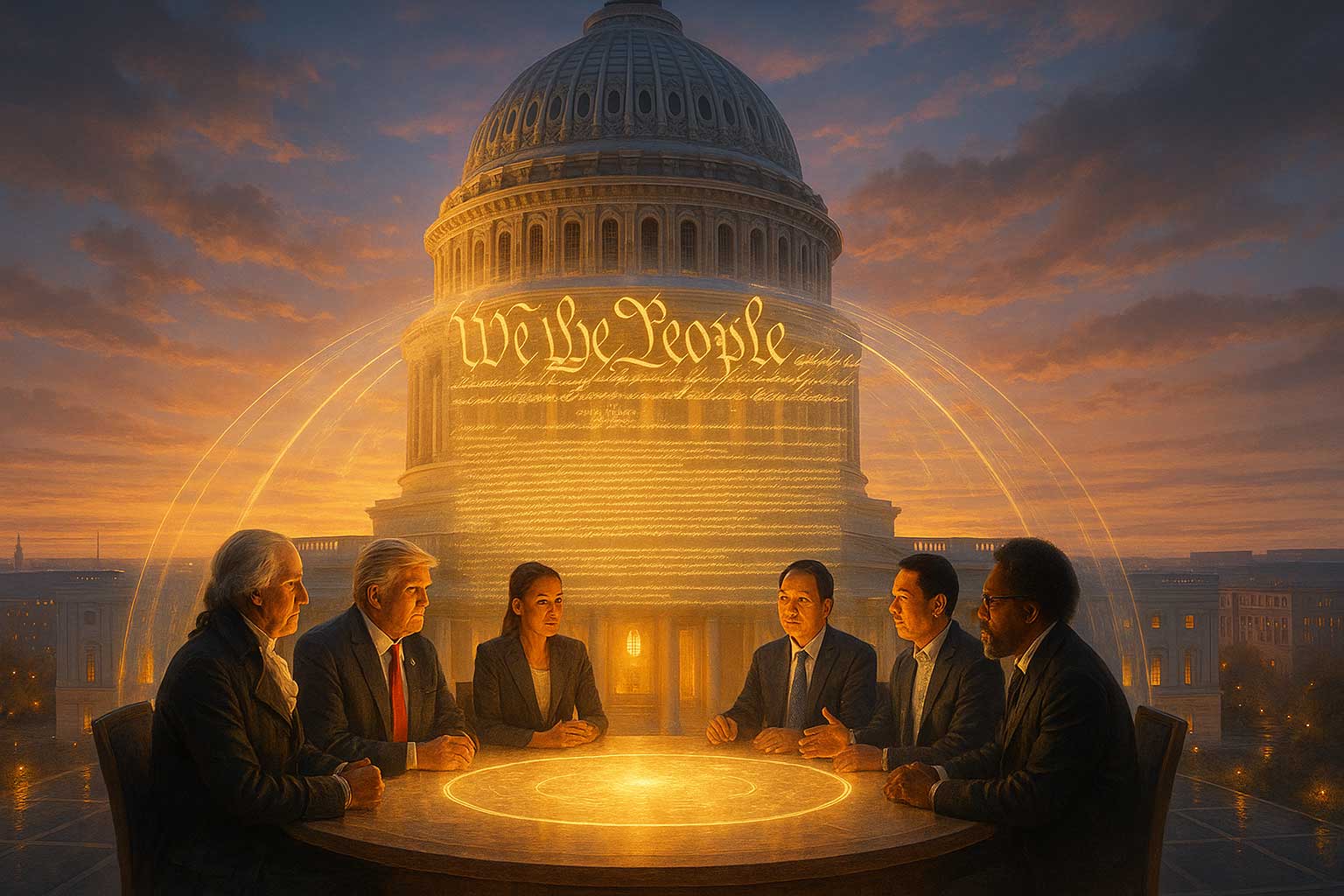
“Every generation is tested by the same question: will you preserve what we built, or perfect it?”
The answer cannot be found in party platforms or parliamentary maneuvers, but in the quiet resolve of those who remember that government is a sacred trust, not a sport to be won. The Senate must rediscover its higher purpose — not as a stage for obstruction, but as a workshop for the Republic’s renewal.
The filibuster will fade or reform, but the true battle lies within the hearts of those who wield it. When senators seek victory over one another instead of justice for all, they betray the oath that binds them to the nation’s soul.
In my time, we dared to believe that self-government could endure — that free men and women, bound by conscience and common cause, could govern not by force, but by faith. If this generation can once again unite principle with courage, then America will not merely survive its divisions — it will transcend them.
For the Republic endures not because it is flawless, but because it remembers. And when the Senate remembers why it was born, the nation will remember how to lead.
Short Bios:
George Washington
First President of the United States, Washington led the nation’s founding and set the precedent for civic virtue and unity. His Farewell Address warning against political factions continues to echo through every debate on democracy and leadership.
Donald J. Trump
The 47th President of the United States, Trump’s tenure emphasized populism, deregulation, and a challenge to the traditional political establishment, reshaping modern conservative discourse in America.
Alexandria Ocasio-Cortez
U.S. Representative from New York, Ocasio-Cortez is a progressive lawmaker focused on climate action, social equity, and government transparency, known for energizing younger generations into civic participation.
John Thune
Senate Minority Whip from South Dakota, Thune is a steady conservative voice advocating fiscal discipline, constitutional balance, and pragmatic leadership within Congress.
Andrew Yang
Entrepreneur and former presidential candidate, Yang promotes innovation-driven policies such as Universal Basic Income and the ethical use of technology to strengthen democracy.
Cornel West
Philosopher, theologian, and civil rights scholar, West speaks for moral courage and compassion in public life, urging America to align power with love and justice.

Leave a Reply